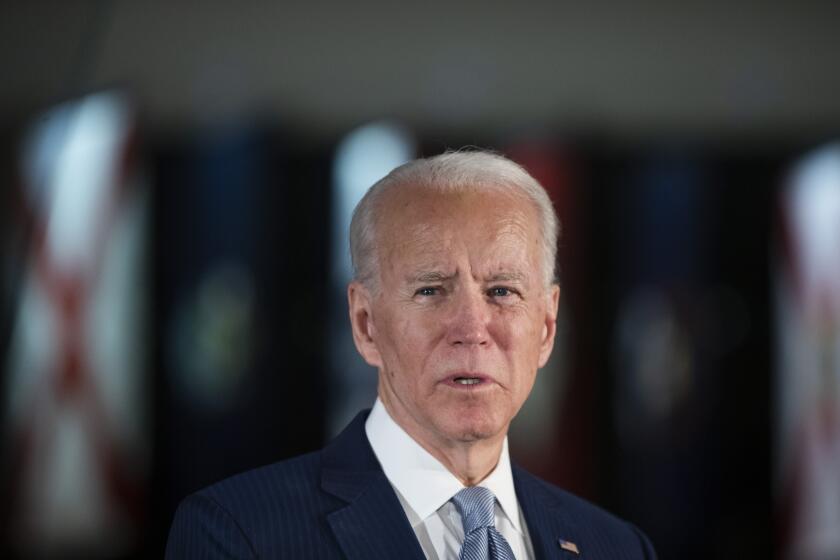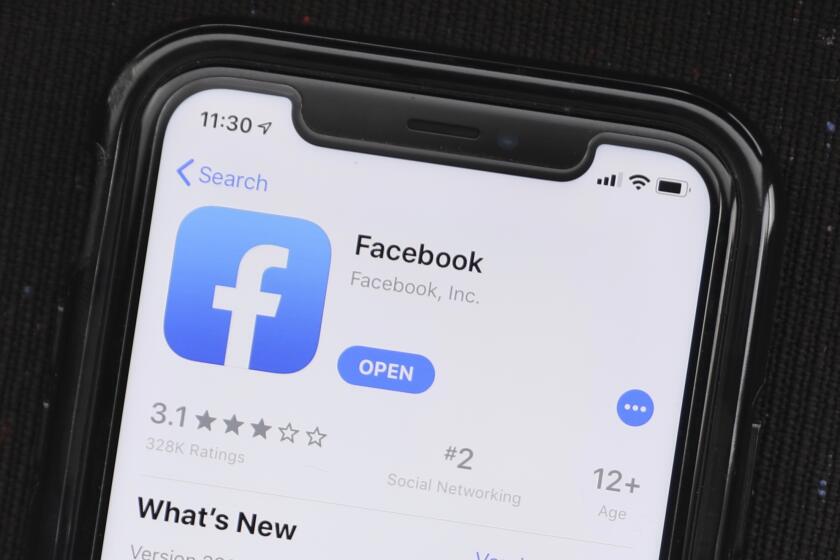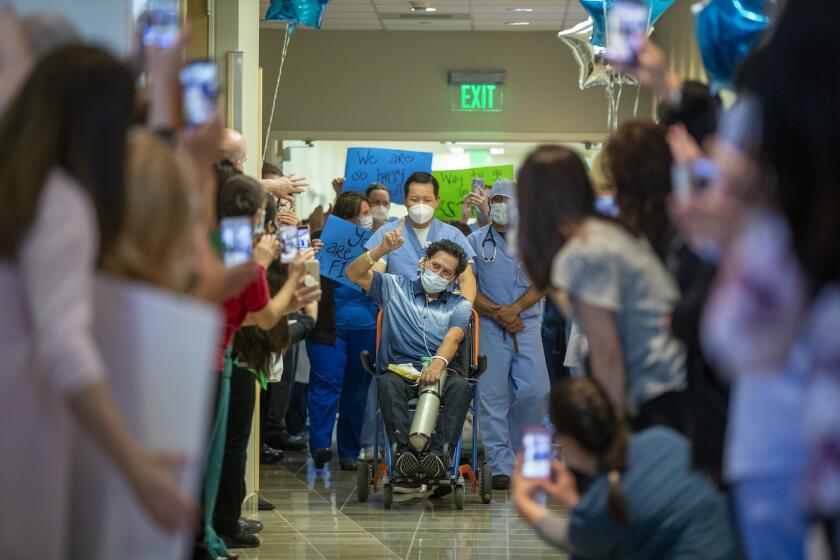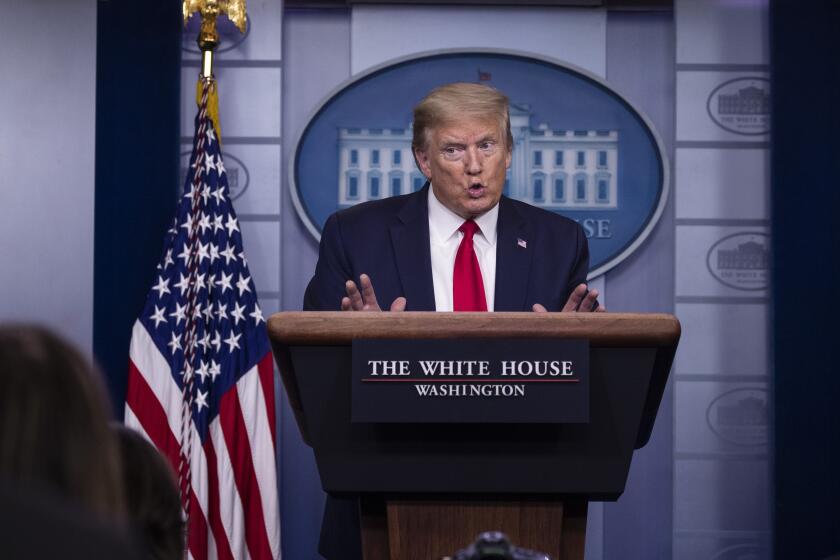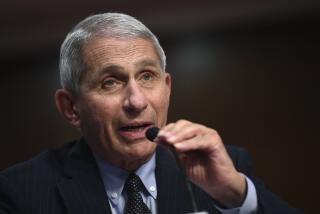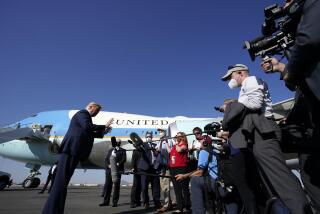Trump’s improvised medicine show prompts frantic health warnings

- Share via
WASHINGTON — A slew of federal and state agencies — and the makers of laundry bleach — issued an implicit rebuke to President Trump on Friday, warning the public that his off-the-cuff medical advice and off-the-wall musings in nightly White House briefings could endanger even more lives as the country’s coronavirus death toll passed 50,000.
A day after Trump sparked a furor when he incorrectly suggested that household disinfectant could be used as an “injection inside” to kill COVID-19, the disease caused by the coronavirus, health officials, federal lawmakers and the Consumer Product Safety Commission warned Americans not to try cleaning products as medicine.
“Cleaning products are poisonous, America! Make sure you keep those cleaning products in their original bottles and locked up out of sight and out of reach of kids!” the agency tweeted and attributed it to its mascot, Quinn the Quarantine Fox.
The Food and Drug Administration warned that using two anti-malarial drugs that Trump has repeatedly touted as a therapeutic could have potentially lethal side-effects, citing a new study that showed increased mortality among patients in an experimental trial.
Other agencies and officials publicly cautioned Americans not to test therapeutics for COVID-19 without a medical professional’s guidance.
“A reminder to all Americans- PLEASE always talk to your health provider first before administering any treatment/ medication to yourself or a loved one. Your safety is paramount, and doctors and nurses are have years of training to recommend what’s safe and effective,” Surgeon Gen. Jerome Adams tweeted.
The frantic chorus of corrections and criticism underscored the depth of concerns about the president, loath to trust experts and science over his own instincts, using his increasingly bizarre televised bully pulpit each night to casually dispense misguided medical advice.
“I’m not a doctor,” Trump said Thursday. “But I’m, like, a person that has a good you-know-what,” he added, pointing to his head.
The FDA’s warning Friday made clear that hydroxychloroquine and chloroquine, the anti-malaria drugs that Trump first celebrated weeks ago as a potential panacea, can cause dangerous abnormalities in heart rhythm in coronavirus patients and should be used only in clinical trials or hospitals where patients can be closely monitored for heart problems.
Warnings from the Clorox Co., as well as the British company that makes Lysol and Dettol, and the American Chemistry Council were also emphatic.
“Chlorine bleach and other disinfectants should never be ingested or injected into the body to treat infections such as COVID-19. Such a practice could be lethal or cause serious bodily harm,” the council’s statement said.
In Maryland, over 100 people called a hotline to ask about injecting or ingesting disinfectants, according to the office of Gov. Larry Hogan, a Republican. In response, the state’s Emergency Management Agency warned, “This is a reminder that under no circumstances should any disinfectant product be administered into the body through injection, ingestion or any other route.”
Democrats piled on. House Speaker Nancy Pelosi (D-San Francisco) mocked Trump for “asking people to inject Lysol into their lungs,” and former Vice President Joe Biden, the party’s presumptive presidential nominee, tweeted: “I can’t believe I have to say this, but please don’t drink bleach.”
By the end of the day, Trump appeared almost chastened. Although he sometimes speaks for two hours or longer in his daily coronavirus briefings, he turned and walked off after 21 minutes Friday without answering any questions.
It was his shortest briefing since he began them on March 14, and the first time he declined to engage with the assembled reporters, possibly a sign he is rethinking the political benefits of his lengthy performances as Americans face a mounting medical and economic catastrophe.
Joe Biden, suggesting Trump will use the coronavirus to try to postpone the election, wants Congress to provide money for states to allow mail ballots.
Earlier Friday, the White House had argued that the media had been irresponsible to quote the president or to take his words literally.
“Leave it to the media to irresponsibly take President Trump out of context and run with negative headlines.” Kayleigh McEnany, the White House press secretary, said in a statement.
Trump rarely if ever admits a mistake, instead belatedly insisting at times that an unusually egregious or offensive comment was made in jest and that others misunderstood him or can’t take a joke.
He offered that explanation Friday morning, insisting to reporters in the Oval Office that he was being sarcastic when he suggested doctors should look into whether “a disinfectant” could be used as “an injection inside” to kill the virus.
“I was asking a question sarcastically to reporters like you just to see what would happen,” he said.
Even Fox News hosts, usually among Trump’s strongest cheerleaders, expressed skepticism at that claim, noting that Trump hadn’t sounded at all sarcastic at the time.
Facebook said it will soon let users know if they ‘liked,’ reacted to or commented on posts with harmful misinformation about the coronavirus.
Trump’s inclination to view his rhetoric as fungible — his comments are often intentionally open-ended and then open to ex post facto dismissals — reflects a lifelong effort to blur context and avoid consequences for his comments and actions.
Trump’s shifting and often self-contradictory comments are a feature of his nightly briefings, where questions and specifics typically drown in a sea of self-lavished superlatives.
Last week, he managed to flip-flop three times on how quickly to lift stay-at-home orders, first insisting that he had “total” authority to order states to reopen, then telling governors that they, not he, had that authority, and then urging citizens to protest decisions by the governors and “liberate” their states.
These are some of the unusual new scenes across the Southland during the coronavirus outbreak.
This week, he first applauded Georgia Gov. Brian Kemp’s plan to reopen bowling alleys, tattoo parlors and nail salons in his state — and then publicly bashed him for it when medical professionals were aghast.
He said he planned to use the Defense Production Act to produce additional swabs for COVID-19 tests, only to say one day later that he was not. He teased a blanket ban on immigration, then announced a 60-day halt on issuing new work permits for immigrants, saying it was “subject to change.”
Recent polling shows Trump receiving low marks for his handling of the coronavirus crisis. Some allies believe the briefing room appearances are hurting him and have communicated that message to the president directly, but to little avail.
“In times of crisis, all the models say provide steady leadership, calm people down ... right now, it’s all mixed signals,” said Linda DiVall, a longtime GOP pollster in Washington.
Trump, she said, has good medical advisors “and there are many times the press conference could end naturally … but he feels compelled to come back on stage and play the scientist … it’s disastrous.”
Trump suggested the controversial therapies Thursday after a presentation from William Bryan, acting head of the Department of Homeland Security’s science and technology division, who outlined research suggesting the coronavirus was weakened when exposed to strong sunlight and disinfectant.
“So, supposing we hit the body with a tremendous — whether it’s ultraviolet or just very powerful light — and I think you said that that hasn’t been checked, but you’re going to test it,” Trump said. “And then I said, supposing you brought the light inside the body, which you can do either through the skin or in some other way, and I think you said you’re going to test that too. It sounds interesting.”
He continued to riff on the subject.
“And then I see the disinfectant, where it knocks it out in a minute. One minute,” Trump said. “And is there a way we can do something like that, by injection inside or almost a cleaning. Because you see it gets in the lungs and it does a tremendous number on the lungs. So it would be interesting to check that. So, that, you’re going to have to use medical doctors with. But it sounds — it sounds interesting to me.”
Trump then sought affirmation from Dr. Deborah Birx, the coronavirus response coordinator seated to the side of the podium. Cameras caught her grimacing uncomfortably, but the initial White House transcript Thursday night quoted her as having agreed with him about sunlight and heat being used to treat COVID-19.
Trump is using the coronavirus crisis as an opportunity — or as political cover — to make sweeping changes to regulations and push controversial new policies.
“That is a treatment,” the early White House transcript quoted Birx as having said. What she had actually said, a corrected transcript showed Friday morning, was: “Not as a treatment.”
When pressed Thursday as to why he continued to float untested and potentially dangerous remedies, Trump lashed out at the reporter who questioned him.
“I’m the president and you’re fake news,” he said. “I’m just here to present talent. I’m here to present ideas, because we want ideas to get rid of this thing. And if heat is good and if sunlight is good, that’s a great thing as far as I’m concerned.”
Times staff writers David Lauter, Sarah D. Wire and Noah Bierman contributed to this report.
More to Read
Get the L.A. Times Politics newsletter
Deeply reported insights into legislation, politics and policy from Sacramento, Washington and beyond. In your inbox three times per week.
You may occasionally receive promotional content from the Los Angeles Times.

